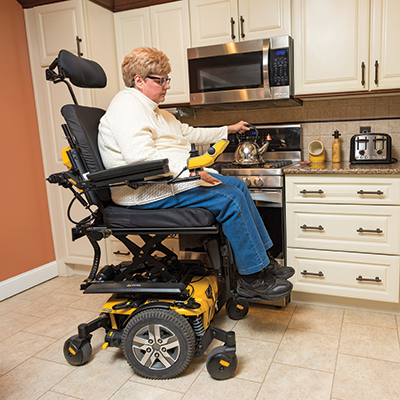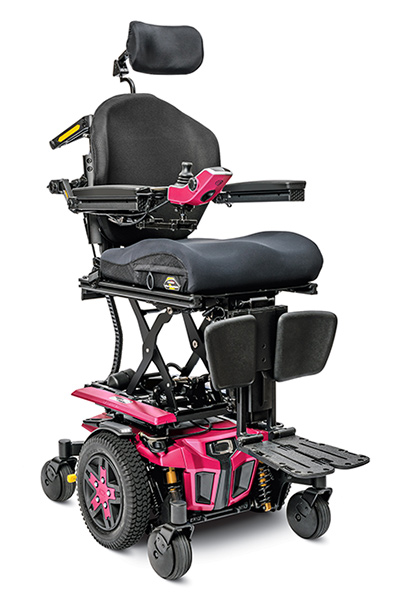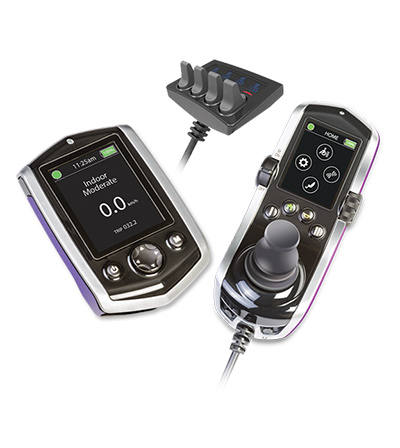Meeting the needs of people living with Multiple Sclerosis
Condition
Multiple Sclerosis (MS) is a chronic, progressive, autoimmune disorder of the central nervous system (CNS). Multiple sclerosis affects neurons, the cells of the brain and spinal cord which carry information and allow the brain to control the body, resulting in loss of muscle control, vision, balance and sensation. MS primarily affects adults between the ages of 20 and 40 and more commonly affects females than males.

Mobility and Assistive Technology Needs
Depending on the progression and type of MS, mobility needs can include canes and crutches, leg braces, walkers, manual wheelchairs and scooters.
There are a portion of people living with MS who rely on the assistance of a power mobility device to assist them with the performance of Mobility Related Activities of Daily Living (MRADLs). These individuals may be able to push a manual wheelchair for a portion of the day, but due to fatigue, also rely on a powered mobility product.
If an individual with MS requires a power wheelchair, it is typically advised to provide a power base that can easily be adapted to meet the individual’s changing seating and electronics needs due to the progressive nature of MS.
It is often recommended to start the individual with a proportional control (joystick) because this provides the most direct control for driving a power base.
As the disease continues to progress and the individual experiences more frequent fatigue, muscle weakness or other conditions affecting the ability to function, specialty controls may be required for the individual to continue performing MRADLs. Optional LED fender lights on the Q6 Edge® 2.0 and Q6 Edge® HD (standard on iLevel® theQ6 Edge® Z and Edge 3) help clients see and be seen.
If the individual has decreased ability to shift weight independently or has developed altered sensation, the individual might very well require the benefits of a power positioning system. Options include tilt and recline systems, power seat elevation with iLevel® and a power articulating foot platform.
The Quantum® Solution

When your client’s symptoms have progressed beyond the use of a manual wheelchair and power mobility is appropriate, a power base with the capability to accept full seating and positioning options and various drive controls. The Edge 3 is compatible with a variety of full seating and positioning components. Optional 4.5 mph iLevel® Power Adjustable Seat Height lifts clients up to 12”, promoting greater independence and social interaction at eye level.
The Q6 Edge® 2.0 and Q6 Edge® Z also accept a wide selection of seating and positioning options and possess a proven track record of quality, reliability and customer satisfaction. Both power chairs have the capability to accept expandable electronics to meet the changing needs of your client.
As the client’s medical continues to progress, a TRU-Balance®3 Power Positioning System (Power Tilt, Power Recline, 4.5 mph iLevel® up to 7.24 km/h and 12", and Power Articulating Leg Rests/Power Articulating Foot Platform) can be added. All TRU-Balance 3 Power Positioning Systems are highly adjustable and allow for growth adjustments. These systems provide many medical benefits to the individual with Multiple Sclerosis, including pressure relief, independent repositioning, positioning for improved breathing and function and increased sitting tolerance.
The TRU-Balance®3 Power Tilt grants you the option of ordering angle-adjustable towers and adjusting the angle of the back canes, which provide optimum positioning and comfort during MRADLs. Since changes in muscle tone can occur with MS, a power tilt system allows a change of position without causing an increase in spasticity, which can cause changes to the client’s seated position.
TRU-Comfort 2 Seating, which provides exceptional comfort and pressure management, in addition to having an aesthetically pleasing look, is a seating option available to a client with MS.
Stealth Products® Cushions have a variety of seat cushions and back rests to meet your client’s individual needs. They provide significant skin protection in order to help your client maintain skin integrity, yet still remain seated on a stable surface.

Q-Logic 3 Advanced Drive Controls are user-friendly and highly customizable. The Q-Logic 3 EX Joystick comes standard with wireless Bluetooth programming through Windows devices and Bluetooth access to computer, tablet and phone functions. Clinic Mode allows for quick and easy setup of multiple input devices during client evaluations and automatically assigns drive modes to input devices. The Q-Logic 3 iAccess features programmable push button and toggle options for customized seating access.
